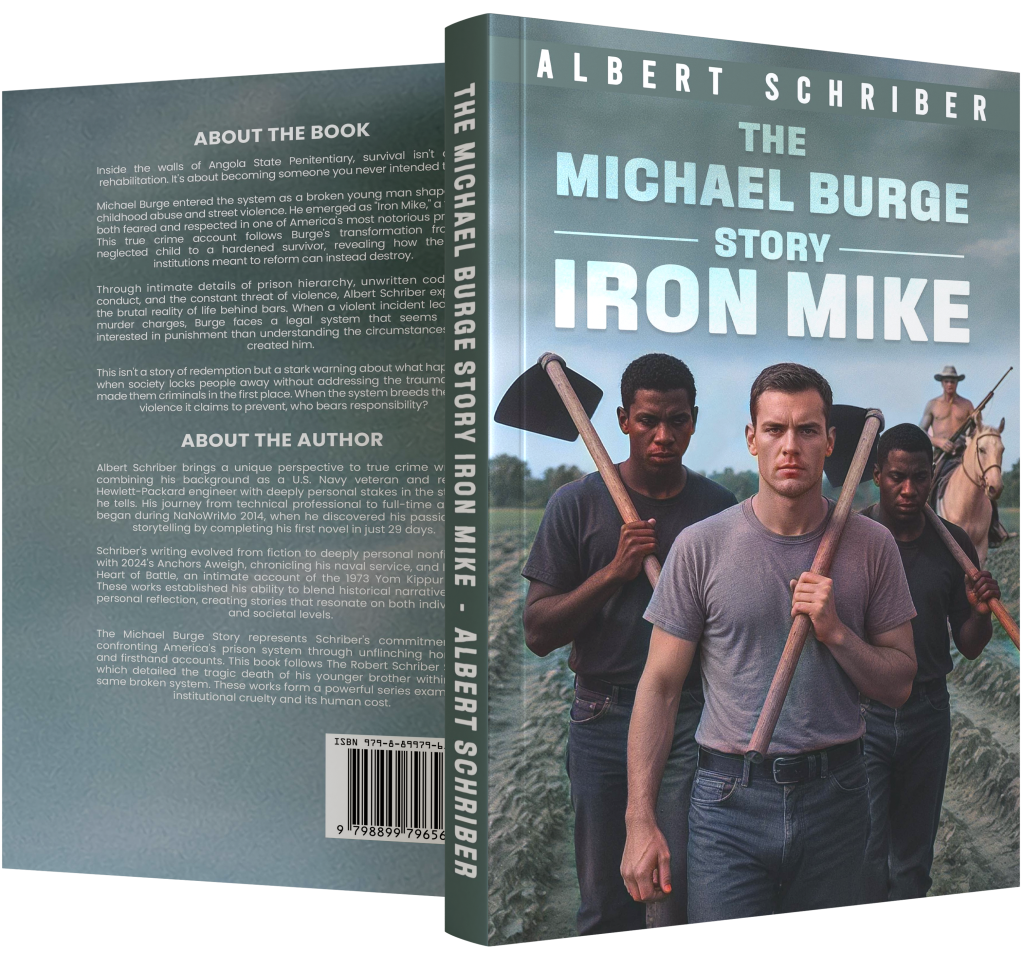The Michael Burge Story:
Iron Mike

The Michael Burge Story:
Iron Mike
Inside the walls of Angola State Penitentiary, survival isn’t about rehabilitation; it’s about becoming someone you never intended to be. Michael Burge entered the system as a broken young man shaped by childhood abuse and street violence. He emerged as “Iron Mike,” a figure both feared and respected in one of America’s most notorious prisons. This accurate crime account follows Burge’s transformation from a neglected child to a hardened survivor, revealing how the very institutions meant to reform can instead destroy.
Through intimate details of prison hierarchy, unwritten codes of conduct, and the constant threat of violence, Albert Schriber exposes the brutal reality of life behind bars. When a violent incident leads to murder charges, Burge faces a legal system that seems more interested in punishment than in understanding the
circumstances that created him. This isn’t a story of redemption but a stark warning about what happens when society locks people away without addressing the trauma that made them criminals in the first place. Who bears responsibility when the system breeds the Violence it claims to prevent?
Choose Your Preference:
Chapters
The woods behind the house were a refuge, a place where the air smelled of pine and damp earth, where the bruises on Michael’s skin felt less like reminders and more like fading memories…
Michael Burge learned early that the world did not offer second chances. By age ten, he had already figured out how to disappear. Running away from home wasn’t an act of rebellion—it was survival. His mother’s drunken rages were …
Michael’s criminal activities eventually landed him in an Angola prison as a teenager. The brutal reality of prison life was a stark contrast to the outside world. Inmates fashioned weapons from whatever they could find, and personal …
Michael had never been one for nicknames. They always felt like labels that people used to define and box you into something manageable. But in Angola, it wasn’t about how you felt about things, but how you made others feel…
Survival wasn’t a goal in Angola. It was a religion—unforgiving, blood-soaked, and practiced with the kind of devotion only desperation could inspire…
By August 1983, Magnolia 3 wasn’t just another dorm—it was a powder keg with a lit fuse. The air was different in there. Heavier. Tighter. Every laugh sounded like a dare…
When the blood dried and the sirens finally quieted, Angola didn’t pause to reckon with what had just unfolded. It didn’t mourn the dead or question how things had gotten that far. It simply swallowed …
The courtroom didn’t smell like blood or sweat, but the air was thick all the same, tight with tension, heavy with the kind of judgment that pressed down harder than any prison wall ever could. Angola’s dormitories had their brand of …
The courtroom grew colder as the witnesses took the stand, one after another, dragging the events of that August night into the open. Each account chipped away at the silence Michael Burge had wrapped around himself like …
They were coming back. Five days of waiting. Five days of staring at the concrete ceiling of a holding bunk, feeling the stretch, stretch, minutes, gnawing at him from the inside. Every tick of the clock felt like another inch of his soul being eroded...
Of all the horrors Michael Burge had endured—his blood-streaked past, the violence in Angola, the cold stare of a jury that couldn’t see the boy buried under years of …
Over the years, Michael Burge became something else—something harder to name than an inmate or convict or case number. He became a fixture in the rhythm of Angola’s brutal ecosystem. Not just surviving it, but adapting to it, …
Prison had a way of silencing the present and amplifying the past. The clang of bunk doors, the shuffle of feet down dim corridors, even the monotonous routines—all of it seemed to stretch time until it bent backward. In the solitude …
The prison was a crucible where the weak were broken, and the strong were slowly worn down. Over the years, Michael learned that surviving in Angola wasn’t just about …
From the moment Michael entered Angola, it was clear that survival depended on more than brute strength or street smarts. The true currency in prison was knowledge, specifically, knowledge of the unwritten inmate code…
Michael had long since stopped expecting Angola to change. What changed—what constantly changed—was the man trapped inside it…
Why Read It?
This isn’t a story of redemption but a stark warming about what happens when society locks people away without addressing the trauma that made them criminals in the first place. When the systern breeds the very Violence it claims to prevent, who bears responsibility?


